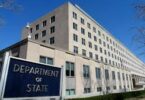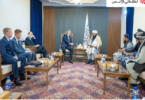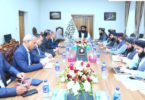KABUL (Guardian News): Afghanistan’s political chaos has deepened with disputes over presidential election results and a planned prisoner exchange delaying peace talks with the Taliban even as the US starts its troop withdrawal.
A US agreement with the Taliban signed last month on the departure of American forces was meant to set the stage for Afghans to reach a deal on their country’s political future after decades of civil war but those talks, expected to begin this week in Oslo, have been postponed indefinitely.
The Taliban say they will not sit down unless they get a mass prisoner release that was promised by the US government, but never cleared with the Afghan authorities who actually hold insurgent fighters.
The withdrawal agreement with the US calls for 5,000 Taliban fighters to be released before negotiations start, in exchange for 1,000 government security forces. A proposed compromise has already been rejected by the insurgent group.
And with two competing presidents both claiming to have won last year’s vote it may prove hard to provide an official delegation for any talks, although the US envoy Zalmay Khalilzad is on the ground in Kabul trying to broker an agreement between incumbent Ashraf Ghani and his main challenger Abdullah Abdullah.
The two on Monday held parallel presidential inaugurations just a few hundred metres apart, broadcast nationwide on split screens.
Ghani’s position was strengthened after the US, and other key allies, attended his swearing in and officially recognised his victory. In his inauguration speech, Ghani promised a compromise on the US-negotiated prisoner exchange, which he had initially furiously rejected as a violation of sovereignty.
“The rapid turnaround of President Ghani’s position on prisoner exchange, which up until his ceremony had been quite hardline … suggested a stark quid pro quo to many observers here in Kabul: US attendance and recognition for a softened stance on this early hurdle in the peace process,” said Andrew Watkins, senior Afghanistan analyst with International Crisis Group.
“International recognition isn’t the only or even most important source of popular legitimacy for the Afghan government, but for a country so heavily dependent on foreign assistance, yesterday’s tilt in recognition of Ghani was a heavy blow (for Abdullah).”
In the early hours of Wednesday, Ghani’s spokesman, Sediq Sediqqi, said on Twitter that he had “signed the decree that would facilitate the release of the Taliban prisoners in accordance with an accepted framework for the start of negotiation”.
Ghani’s administration offered a limited release of 1,500 prisoners starting on Saturday, with 100 men going free a day.
Once negotiations began, and if the Taliban reduced attacks, the other 3,500 would be released in batches of 500 every fortnight. All those released would have to sign a pledge not to return to the battlefield, Sediqqi said.
The Taliban immediately shot down that offer. “We handed over to the US team a detailed list of 5,000 prisoners that none can tamper with,” tweeted Suhail Shaheen, spokesman for the Taliban’s political office in Doha, where the deal was signed.
“We never agreed to any conditional release of prisoners,” he later told Reuters by phone. “It is properly explained in the peace accord that first 5,000 prisoners would be freed and then the Afghan dialogue would be initiated.”
The deal signed 29 February allows for American troops to leave Afghanistan within 14 months, allowing Donald Trump to fulfil his promise to end America’s longest war and bring home its soldiers.
However, the US commander for the Middle East and Afghanistan has already warned this week that the insurgents are not keeping “their part of the bargain”, instead continuing to launch attacks.
Marine Gen Frank McKenzie was giving evidence to Congress on Tuesday, hours after US forces began pulling out of Afghanistan. The US-Taliban deal followed a week-long partial ceasefire, but it did not include an agreement to continue that ceasefire, and attacks have since increased again.
“They are not directed against coalition forces, they are not occurring in city centres, they are occurring at isolated checkpoints,” McKenzie said. “But those attacks are occurring, and they’re not consistent with a movement toward a negotiated settlement, and they’re not consistent with the undertaking they made.”
Trump administration officials have said that the withdrawal of the 13,000-strong US military presence in Afghanistan would be “conditions-based”. But there has been concern in Washington as well as Kabul about what the requirements might be.
Detailed terms are laid out in a secret annex that US lawmakers have been able to read, but not share. Several said they were concerned that the terms were too vague, in interviews with the New York Times.






